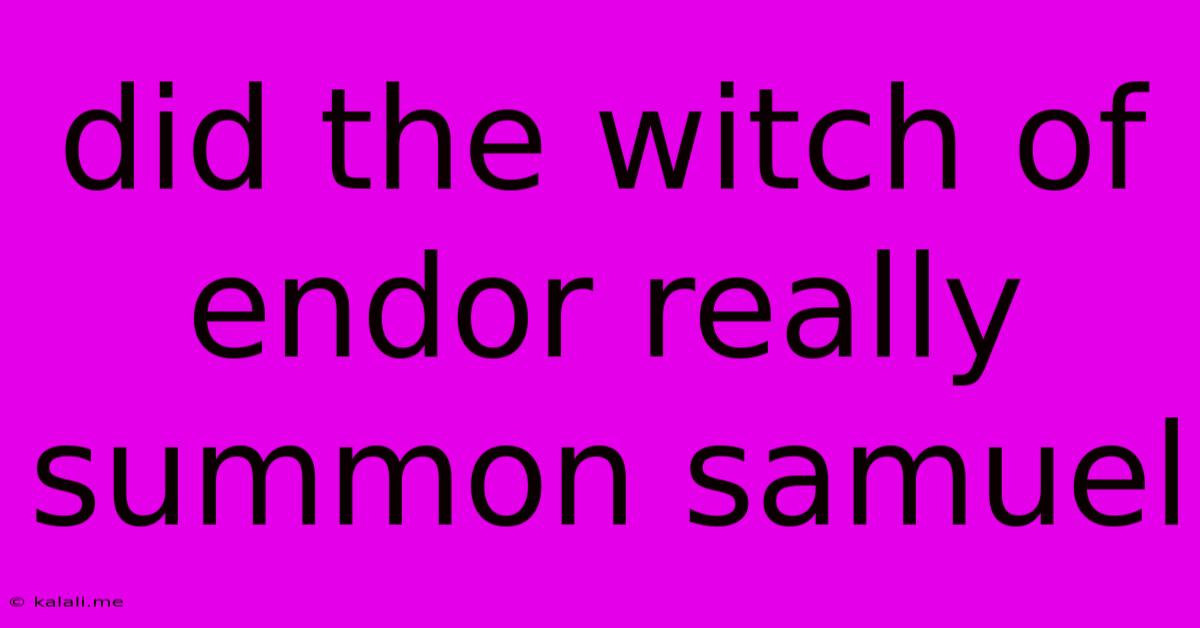Did The Witch Of Endor Really Summon Samuel
Kalali
Jun 08, 2025 · 3 min read

Table of Contents
Did the Witch of Endor Really Summon Samuel? A Critical Examination of 1 Samuel 28
The story of the Witch of Endor summoning the prophet Samuel in 1 Samuel 28 is one of the most debated and enigmatic passages in the entire Bible. Did this necromancer truly contact the deceased Samuel, or was it a deceptive vision, a demonic impersonation, or something else entirely? This article will explore the various interpretations and arguments surrounding this fascinating and controversial event.
The Narrative in 1 Samuel 28: Saul, facing imminent battle with the Philistines and abandoned by God, desperately seeks guidance. Forbidden from consulting God directly, he secretly visits a woman with known necromantic abilities, the Witch of Endor. Against her initial reluctance, she performs a ritual, and a figure emerges from the ground, identified as Samuel. This figure delivers a grim prophecy of Saul's impending defeat and death.
Interpretations and Arguments:
Several interpretations attempt to explain the events described:
1. Literal Interpretation: A Genuine Summoning of Samuel
This view suggests that the Witch of Endor actually contacted Samuel's spirit. Proponents often cite the text's seemingly straightforward description of the encounter. They point to the woman's surprise and fear upon seeing Samuel, suggesting genuine interaction with a supernatural entity. However, this interpretation struggles to reconcile the event with biblical prohibitions against necromancy.
2. Deceptive Vision or Hallucination: A Supernatural but Not Literal Samuel
This perspective suggests that the Witch of Endor, perhaps through skillful deception or manipulation of the occult, induced a vision or hallucination in Saul. The “Samuel” that appeared was not the actual prophet but a supernatural deception designed to fulfill the witch's purpose. This avoids the contradiction of God allowing necromancy while also acknowledging the supernatural nature of the event. The vision’s accuracy could be seen as a consequence of demonic insight into future events.
3. Demons Masquerading as Samuel: A Demonic Impostor
This interpretation is similar to the second, but proposes the vision or apparition was a demon specifically imitating Samuel. This allows for the accurate prophecy, as demons often possess a level of insight into the future, and explains the narrative without requiring a literal raising of the dead. This view fits with the general biblical warnings against necromancy and its association with demonic activity.
4. A Combination of Factors: A Complex Supernatural Event
Some scholars argue for a multifaceted explanation. The Witch of Endor may have possessed genuine occult abilities, but her contact was not directly with Samuel. Instead, it could have been a demon influenced by Samuel's past prophecies or a spirit capable of communicating Samuel's essence through a distorted lens. This would explain the accuracy and yet the ambiguous nature of the encounter.
Challenges and Considerations:
Regardless of the interpretation chosen, several key challenges remain:
- Biblical Consistency: The passage appears to contradict clear biblical prohibitions against necromancy (Deuteronomy 18:10-12). Resolving this inconsistency is crucial to any interpretation.
- The Nature of the Afterlife: The passage raises profound questions about the nature of the afterlife and the possibility of communicating with the dead. Different theological viewpoints will significantly influence interpretation.
- Saul's Desperation: Saul’s actions highlight the danger of resorting to forbidden practices in times of desperation. His disregard for God's commands ultimately contributed to his downfall.
Conclusion:
The story of the Witch of Endor remains a source of ongoing theological debate and scholarly discussion. While a definitive answer may be elusive, examining the various interpretations alongside the historical and cultural context helps illuminate the complexities of this pivotal biblical narrative. Whether a literal summoning, a demonic deception, or a complex combination, the episode serves as a cautionary tale regarding forbidden practices and the dangers of seeking guidance outside God's ordained channels. It also highlights the enduring fascination with the supernatural and the human desire to communicate with the beyond.
Latest Posts
Latest Posts
-
Show All Post Types On A Specific Page Wordpress
Jun 08, 2025
-
How To Get Permanent Marker Off Wood Table
Jun 08, 2025
-
Gettinh Only Qunatifier But No Qualifier Ion
Jun 08, 2025
-
How To Remove Photo Stuck To Glass
Jun 08, 2025
-
How To Turn On Keep Inventory
Jun 08, 2025
Related Post
Thank you for visiting our website which covers about Did The Witch Of Endor Really Summon Samuel . We hope the information provided has been useful to you. Feel free to contact us if you have any questions or need further assistance. See you next time and don't miss to bookmark.